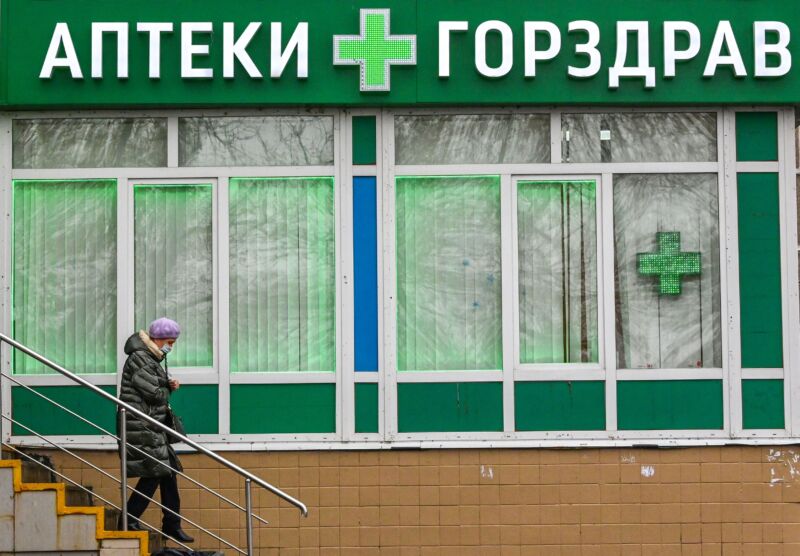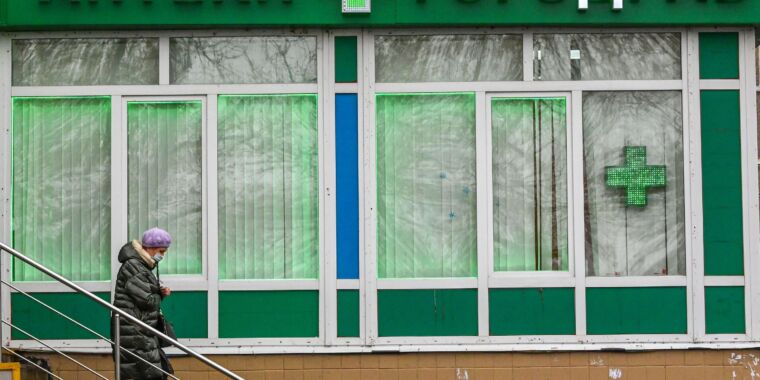
As Western countries continue to ramp up sanctions and boycotts against Russia, the country’s citizens are buying drugs in panic, such as antidepressants, sleeping pills and contraceptives, Reuters said.
Between February 28 and March 13, Russians bought 270.5 million pharmaceutical items worth about $104 billion, according to sales data collected for the Russian business newspaper Vedomosti. That two-week purchase was comparable to what Russians bought at pharmacies throughout January, where 280 million pharmaceutical items were bought.
The analysis, conducted by the Russian analytics company DSM Group, found that the demand for drugs, including antidepressants, sleeping pills, insulin, cancer and heart drugs, hormones and contraceptives, increased sharply.
The increase is due to “fear,” Sergei Shulyak, CEO of DSM Group, told Reuters. “The first fear was that everything would become more expensive,” he said, “and the second fear was that drugs they need will not be available in a while. Those fears touched people. They stood in line at pharmacies and bought everything .”
While Western countries and high-profile companies, such as Apple and McDonald’s, have imposed various punitive economic sanctions and boycotts, the pharmaceutical industry has largely resisted cutting the Russians off. Many drug makers — and some ethicists — say drug companies have a humanitarian obligation to continue supplying vulnerable patients in the country with life-saving drugs, such as insulin, cancer therapies, cardiovascular drugs, and products for infants and pregnancy.
Earlier this month, Pfizer released a statement saying it would “maintain the humanitarian supply of medicines to Russians and donate all proceeds to providing direct humanitarian aid to the people of Ukraine.” In an interview on March 13 on CBS’ Face the nationexplained Pfizer’s CEO Alberta Bourla, saying that the company’s activity in Russia “may make up less than half a percent of our total sales,” but war restrictions “don’t apply to drugs because lives are involved. “
“How can you say, ‘I’m not going to send the cancer drugs to the Russians because of what they’ve done?'” he said.
Crime and Punishment
Other major pharmaceutical companies, such as Johnson & Johnson, Roche and Bayer, have released statements similar to Pfizer’s. “Withholding vital health and agricultural products from the civilian population… would only multiply the ongoing toll of war on human life,” Bayer wrote in its statement.
But not everyone agrees on how drugs should respond to Russia’s brutal invasion of Ukraine, which involved at least 64 verified attacks on healthcare facilities, workers and ambulances. Oxford biomedical ethicist Julian Savulescu and Ukrainian-born midwife Alex Polyakov of the University of Melbourne published a piece in The Conversation on Thursday arguing that pharmaceutical companies have not gone far enough. Instead, the companies should cut Russians off all but essential drugs, as defined by the World Health Organization.
“Drugs not on the essential list should be withheld,” they wrote, including “medicines for non-life-threatening complaints such as acne, erectile dysfunction, cosmetic drugs and fertility drugs. This action would be consistent with both their humanitarian obligations to Russian patients.” and their obligations as global citizens.”
But others have gone further. In a controversial March 11 commentary in the publication Medscape, New York University medical ethicist Arthur Caplan argued that drug companies should cut Russians completely off from medical products. †[N]o The sale of drugs or therapies should take place, whether life-saving or consumer products,” he wrote.
He continued:
The Russian people must be pinched not only by the loss of cheeseburgers and boutique coffee, but also by the products they use to maintain their well-being. War is cruel that way, but if you tolerate a government that bombs a peaceful neighbor and shoots it into oblivion, then the pharma must make… efforts to make Putin and his kleptocratic thugs feel the wrath of their fellow citizens. . [A]reaching a quick, just solution to tyranny allows no exceptions for pharma or other matters if it is a war to be fought.
For now, DSM’s Shulyak sees the drug shortage as temporary because people are stockpiling based on fear. He told Reuters he expects supplies to stabilize soon as domestic production and imports continue, though he acknowledged prices could rise.

